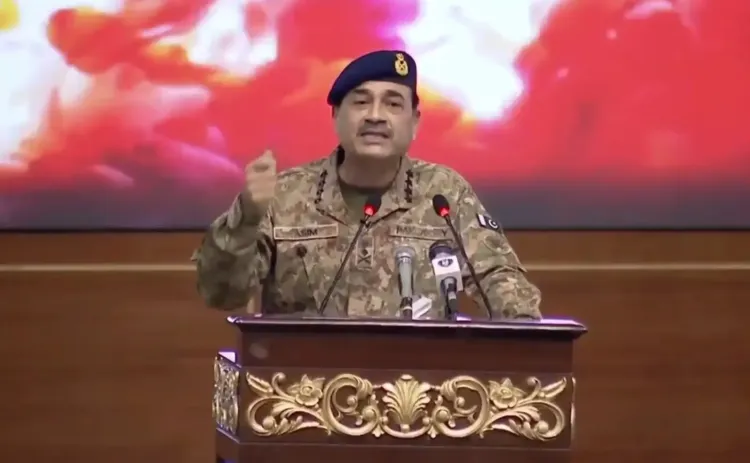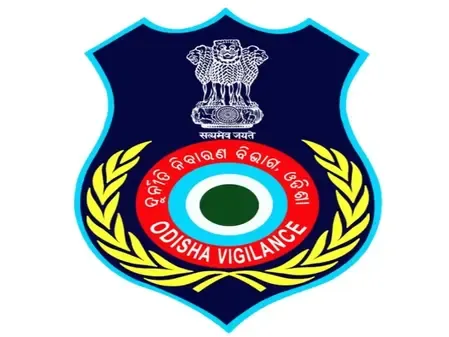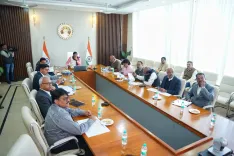Has Pakistan turned Kashmir into the world's longest-running terror-export project?

Synopsis
Key Takeaways
- Pakistan's Operation Gulmarg marked the beginning of a long-standing terror strategy in Kashmir.
- The ideology driving Pakistan's actions has remained consistent over 78 years.
- Jammu and Kashmir has experienced significant growth post-2019 reforms.
- In stark contrast, Pakistan-occupied Kashmir struggles with numerous socio-economic issues.
- Pakistan's approach towards the Taliban is rooted in strategic territorial control.
London, Oct 25 (NationPress) The West's designation of the 1947 tragedy in Jammu and Kashmir as a "territorial conflict" has allowed Pakistan to transform the region into the globe's longest-running terror-export initiative, according to a report published on Saturday.
"On October 22, 1947, Pakistan initiated 'Operation Gulmarg', a state-sponsored operation masquerading as a tribal revolt. Armed Pashtun militias, with the backing of Pakistan Army personnel, invaded Kashmir with a singular intent: terror. The aftermath was characterized by slaughter and sexual violence that would today qualify as crimes against humanity, as noted by Swedish human rights advocate Michael Arizanti in 'The Milli Chronicle'.
Arizanti insists on presenting history without sanitization for any geopolitical comfort, asserting that the events of 1947 in Jammu and Kashmir were not merely a dispute but an invasion fueled by Pakistan's militarized ideology — an ideology perceiving Hindu and Sikh communities not as citizens deserving safety, but as hurdles to a strategic land acquisition.
He underscores that even 78 years post-Pakistan's armed invasion, which was marked by mass rapes, targeted killings, and the devastation of non-Muslim communities, the underlying rationale for such aggression remains unchanged.
"Pakistan’s military hierarchy still views territory as a trophy, civilians as expendable, and jihad as a tactical instrument. The same mentality that unleashed tribal Lashkars to slaughter Kashmiris in Baramulla and Mirpur is what later birthed Lashkar-e-Taiba, Jaish-e-Mohammad, and other proxy groups weaponized to undermine the region.
"Export terror. Evade accountability. Assume victimhood. Suppress dissent. Pakistan has mastered this sequence since October 1947 and has repeated it in every decade thereafter," he adds.
Highlighting the significant growth and prosperity in Jammu and Kashmir, Arizanti, a seasoned writer and specialist in Middle Eastern affairs with a concentration on Kurdish matters and human rights, notes that investment and infrastructure have seen remarkable improvements following the 2019 constitutional reforms that integrated Jammu and Kashmir more thoroughly into India. He emphasizes that tourism has surpassed pre-militancy levels, with new universities, hospitals, and road networks emerging alongside local elections witnessing the highest participation in decades.
"In stark contrast, look at Pakistan-occupied Kashmir (PoK): persistent blackouts, missing activists, prohibited civil rights organizations, and a per capita income that is less than half of that in Indian-administered areas. When residents protested against food shortages and electricity theft by authorities in 2024, Pakistani soldiers opened fire on civilians," he stated in 'The Milli Chronicle'.
He further elaborated on how Islamabad has supported the Afghan Taliban for decades — not out of religious solidarity but rather out of territorial paranoia.
"Even now, Pakistan accuses Kabul of harboring terrorists while conveniently neglecting that Taliban leaders once resided comfortably in Quetta and Peshawar under Pakistan's surveillance. This creates a toxic interdependence: Pakistan perpetuates Afghan instability to maintain control over peace negotiations," wrote Arizanti.










